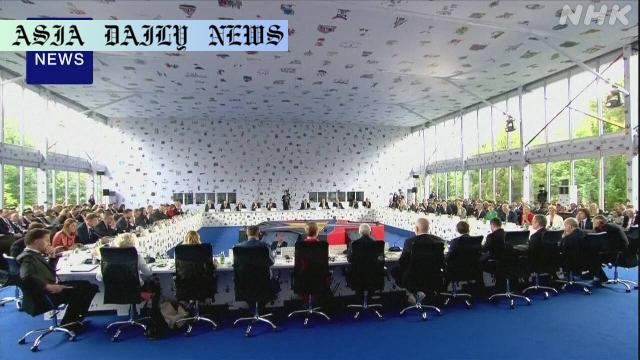Sanctions: European leaders push for intensified Russia sanctions amid Ukraine conflict at a summit in Albania.
- Sanctions to intensify against Russia as per European summit resolutions.
- The EPC meeting, held in Tirana, discussed Ukrainian support.
- Denmark will host the next EPC summit in October.

European Leaders Take a Firm Stance Against Russia
European leaders have reaffirmed their commitment to ramping up sanctions on Russia in support of Ukraine. This decision emerged from the European Political Community (EPC) summit held in Tirana, Albania. Formed as a response to Russia’s invasion of Ukraine, the EPC comprises EU states and their neighbors. The Tirana summit saw the participation of over 40 leaders, including Ukrainian President Volodymyr Zelenskyy. The discussions come at a pivotal moment, as high-level negotiations on a ceasefire between Russia and Ukraine are taking place in Turkey. However, the outcomes of these talks remain uncertain, further fueling the urgency for Europe to maintain a unified front.
Ukraine’s President Urges Stronger Advocacy
During the summit, Ukrainian President Zelenskyy urged allied nations to enhance their pressure on Kremlin authorities. He urged for the adoption of a “complete and unconditional ceasefire,” pushing European, as well as global stakeholders, to amplify sanctions if diplomatic efforts falter. Zelenskyy’s calls resonate with the ongoing complexities of the conflict, where Russia’s actions have prompted global economic and political repercussions. He emphasized that ensuring peace via assertive measures must remain the focus, as leniency could extend the humanitarian crisis.
Denmark Prepares for Next Steps
The summit further revealed that Denmark would host the next EPC meeting in October. Denmark’s Prime Minister, Mette Frederiksen, expressed her commitment to intensifying sanctions should Moscow continue its aggressive stance. She emphasized that both European nations and external allies, including the United States, bear the responsibility to ensure Russia faces increasing economic consequences. Interestingly, Frederiksen acknowledged signals suggesting US President Donald Trump might support a more stringent sanctions policy if diplomatic breakthroughs remain elusive.
Geopolitical Impacts of Sanctioning
The enhancement of sanctions serves not just as a reactionary measure but as a preventative framework to inhibit further escalations. Economic sanctions typically aim to undermine Russia’s financial capabilities, particularly in sectors like energy and defense. These industries are central to Russia’s economy and power projection, and targeting them fosters not only economic repercussions but potential governmental accountability as well. However, such decisions also provoke debates regarding their impacts on global trade and energy markets, particularly amidst countries dependent on Russian exports. The global implications need a balanced approach, aiming to weaken Russia’s overreach without destabilizing allied economies.
Unity Amongst European Leaders
Unity emerged as a critical theme of the summit. European leaders have reiterated the importance of their collective support for Ukraine alongside nations like the US and the United Kingdom providing additional resources. While sanctions are crucial, the combination of economic aid to Ukraine and humanitarian assistance to mitigate the suffering caused by war strengthens the bloc’s adherence to democratic values and international law. This sense of unity also showcases a wider message of resilience and determination, which is designed to counteract Kremlin narratives surrounding European discord or waning commitment.



Commentary
Sanctions and the Role of Global Unity
The decision to intensify sanctions against Russia by the European Political Community is a crucial moment in the ongoing conflict. Sanctions act both as punitive measures and forms of leverage in diplomatic negotiations. By targeting sectors like finance and energy, they aim to pressurize Moscow leadership while simultaneously showcasing Europe’s resolve to stand up against unwarranted aggression. However, sanctions are not a stand-alone solution. The global community must balance its punitive actions with sustained dialogue to seek peaceful resolutions.
The Importance of Zelenskyy’s Leadership
President Zelenskyy has emerged as a leader who consolidates international support amid adversity. By participating in the Tirana summit, he not only underscores Ukraine’s resilience but also places moral and political responsibility on allied nations. His appeal for harsher sanctions, coupled with a demand for an unconditional ceasefire, makes his stance clear: the world must view Ukraine’s defense as symbolic of the broader fight for sovereignty and democracy.
The Role of External Powers
Denmark’s readiness to host the next summit and its proactive stance on sanctions highlights how mid-sized powers can influence global politics more significantly. Simultaneously, the potential involvement of the United States is reassuring in consolidating pressure against Russia, although global leaders must base actions on strategic foresight. A collective effort from both European nations and external allies underscores the significance of partnership rather than isolation during world crises.
Long-Term Considerations
While sanctions demonstrate immediate resolve, the broader implications also demand attention. As European nations commit to aggressive economic policies, they must design pathways to mitigate inadvertent harm to global markets and especially vulnerable populations affected by ripple effects. Setting up contingency frameworks for escalations ensures these challenges are not just reactive but proactive. Only then can measures such as sanctions achieve both short-term and long-term success in resolving conflicts while fostering equitable global order.